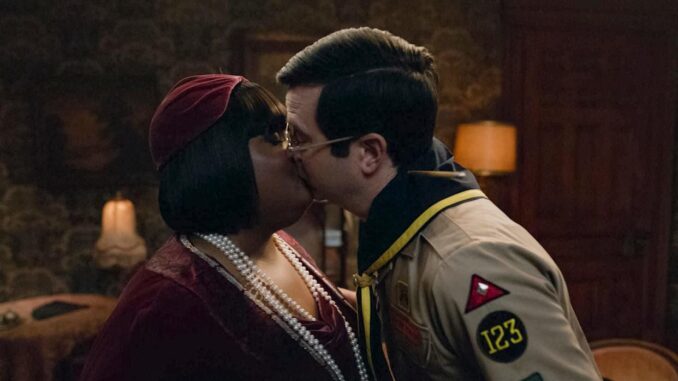
A Long-Awaited Ghosts Kiss Concludes Season 4 and Why It Matters
The very premise of Ghosts – a motley crew of deceased individuals tethered to their former home, interacting with the living through a single, bewildered intermediary – is a tapestry woven from humor, pathos, and the eternal yearning for connection. For four seasons, this unique ensemble has explored the myriad facets of existence, or rather, non-existence, proving that even in death, the human (or spectral) heart continues to beat, yearn, and evolve. It is within this unconventional landscape that the Season 4 finale delivered a moment so profoundly resonant, so achingly beautiful, that it transcended the sitcom format: a long-awaited ghost kiss, and its significance stretches far beyond a simple romantic gesture.
For the purposes of this exploration, let us focus on the kiss that has been simmering for seasons, the one between the prim, secretly gay Revolutionary War officer, Isaac, and his equally British, equally deceased counterpart, Nigel. From their initial, antagonistic dynamic – a relic of their nations' past conflict – a delicate, improbable affection began to bloom. Isaac, burdened by a lifetime of hidden desires and the societal strictures of his era, found himself unexpectedly drawn to the flamboyant, uninhibited Nigel. Their journey was a slow burn, punctuated by furtive glances, unspoken understandings, and the cruel barrier of their incorporeal forms, which rendered physical touch impossible. This incapacity to touch, to feel, to kiss, became a central, poignant metaphor for Isaac's entire existence – a man perpetually denied the expression of his true self.
The anticipation surrounding this particular union was not merely the product of clever writing; it was an emotional anchor for the audience. Isaac's struggle for self-acceptance, his journey from internalized homophobia to tentative, then hopeful, vulnerability, mirrored a path many in the real world have walked. To see him, a man literally stuck in the past, slowly embrace a future where love was possible, was a powerful narrative arc. Nigel, in his unwavering affection and patience, became a beacon of acceptance, a counterpoint to Isaac's centuries of self-doubt. The "long-awaited" nature of their kiss wasn't just about the romantic payoff; it was about the culmination of Isaac's profound personal liberation.
When the moment finally arrived in the Season 4 finale, it was everything and nothing like a conventional kiss. It wasn't a meeting of lips, for they had none to truly press. It was, instead, a profound resonance, an ethereal intertwining of essences. Picture it: a silent explosion of centuries-held longing, a meeting of souls that vibrated with the weight of unexpressed love and the joy of finally being seen, truly seen, for who they were. The show, through subtle visual cues and the actors' masterful expressions, conveyed a feeling that transcended the physical. It was a shiver that rippled through the non-existent flesh, a warmth that bloomed in the spectral chest, a silent declaration echoing through the very fabric of their shared afterlife. It was, in its purest form, a meeting of hearts, unbound by the limitations of their ghostly forms, or the prejudices of their former lives.
This ghostly kiss matters for a multitude of reasons, both within the narrative and for the broader cultural landscape:
Firstly, it completes Isaac's arc. For a character whose deepest regret was the inability to live authentically, this moment is his ultimate redemption. He finds not just love, but acceptance and peace. It’s a powerful statement that it’s never too late to find joy, even in the afterlife, even after centuries of repression. His "unfinished business" has finally been addressed, giving his spectral existence a new, vibrant purpose.
Secondly, it champions diverse representation. In a mainstream network sitcom, the slow, tender development of an older, queer love story is a quiet triumph. It normalizes love in all its forms, demonstrating that affection, connection, and even passion do not diminish with age, time, or even death. It’s a validating moment for LGBTQ+ audiences, particularly those who may have felt unseen or underrepresented in romantic narratives.
Thirdly, it elevates the show's thematic depth. Ghosts is often uproariously funny, but this kiss anchors it in something profoundly human. It solidifies the idea that love transcends all barriers – not just societal ones, but physical, temporal, and even existential ones. It proves that the very essence of connection, of shared vulnerability, can bypass the limitations of the corporeal world. It transforms the show from a clever premise into a deeply moving exploration of what it means to be alive, or truly undead, with a beating heart.
Finally, it provides immense emotional payoff for the audience. In an era of fleeting content and often unearned sentimentality, the slow, deliberate build-up to Isaac and Nigel’s kiss was a masterclass in patient storytelling. Viewers had invested in these characters, watched them grow, and yearned for their happiness. The finale delivered on that promise with grace and authenticity, leaving audiences with a feeling of profound satisfaction and hope. It reminds us that even in the most absurd of circumstances, genuine connection remains the most powerful force.
The long-awaited ghost kiss that concluded Season 4 of Ghosts was more than just a romantic highlight; it was a narrative keystone. It was a testament to the show's heart, a celebration of enduring love, and a quiet, powerful affirmation that even when stripped of physical form, the human spirit's capacity for connection remains boundless, capable of creating magic in the most unexpected of afterlives. It wasn't just a kiss; it was a vibrant, ethereal echo of acceptance, hope, and the profound beauty of being, finally, truly seen.